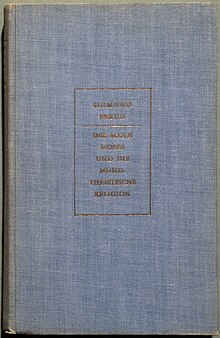 Cover of the first edition | |
| Author | Sigmund Freud |
|---|---|
| Original title | Der Mann Moses und die monotheistische Religion |
| Translator | Katherine Jones |
| Language | German |
| Subject | Egyptology Monotheism |
| Publisher | Hogarth Press |
Publication date | 1939 |
Published in English | 1939 |
| Media type | |
| Pages | 223 (first edition) |
| OCLC | 1065146858 |
| 221.92 | |
| LC Class | BS580 .M6 |
| Preceded by | Civilization and Its Discontents |
Original text | Der Mann Moses und die monotheistische Religion at Project Gutenberg |
| Translation | Moses and Monotheism at Internet Archive |
Moses and Monotheism (German: Der Mann Moses und die monotheistische Religion, lit. 'The man Moses and the monotheist religion') is a 1939 book about the origins of monotheism written by Sigmund Freud,[1] the founder of psychoanalysis. It is Freud's final original work and it was completed in the summer of 1939 when Freud was, effectively speaking, already "writing from his death-bed."[2][3] It appeared in English translation the same year.
Moses and Monotheism shocked many of its readers because of Freud's suggestion that Moses was actually born into an Egyptian household, rather than being born as a Hebrew slave and merely raised in the Egyptian royal household as a ward (as recounted in the Book of Exodus).[4][5] Freud proposed that Moses had been a priest of Akhenaten who fled Egypt after the pharaoh's death and perpetuated monotheism through a different religion,[6] and that he was murdered by his followers, who then via reaction formation revered him and became irrevocably committed to the monotheistic idea he represented.[1]
- ^ a b Stratton, Kimberly B. (August 2017). Copp, Paul; Wedemeyer, Christian K. (eds.). "Narrating Violence, Narrating Self: Exodus and Collective Identity in Early Rabbinic Literature". History of Religions. 57 (1). University of Chicago Press for the University of Chicago Divinity School: 68–92. doi:10.1086/692318. ISSN 0018-2710. JSTOR 00182710. LCCN 64001081. OCLC 299661763.
- ^ Technically speaking, work on Freud's Outline of Psycho-Analysis continued after his completion of the last portion of his Moses & Monotheism manuscript, but this was just a reiteration and condensation of earlier works. See reference No. 4 below for citation.
- ^ Gay, Peter, 1923–2015. (1988). Freud : a life for our time (1st ed.). New York: Norton. pp. 532–548. ISBN 0-393-02517-9. OCLC 16353245.
{{cite book}}: CS1 maint: multiple names: authors list (link) CS1 maint: numeric names: authors list (link) - ^ Freud, Sigmund (1939). Moses and Monotheism. Hogarth Press. pp. 13–15, 56–57, 66–67, 70–71, 80–81, 88, 97.
- ^ "Bible Gateway passage: Exodus 2 –New International Version". Bible Gateway. Retrieved 5 January 2020.
- ^ S. Freud, The Standard Edition of the Complete Psychological Works of Sigmund Freud, Volume XXIII (1937–1939), "Moses and monotheism". London: Hogarth Press, 1964.